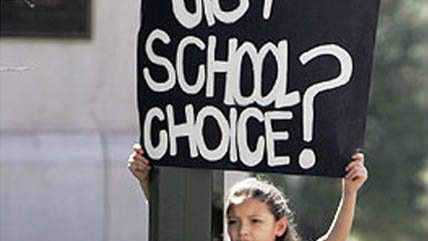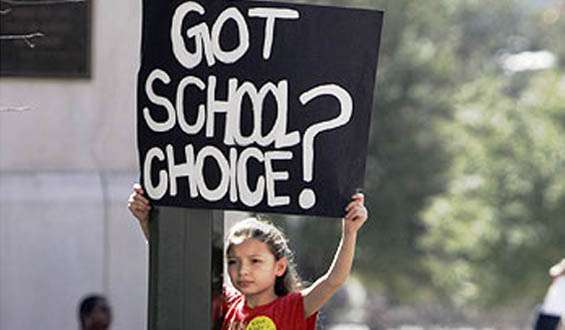Alabama Education Association Wants Kids in Failing Schools
Union sues to block school choice tax credit program


Alabama passed a school-choice plan last Thursday that The Foundry hails as "historic." The Cato At Liberty blog is almost as optimistic, calling the legislation "a good start" and criticizing only the fact that it may inadvertently encourage schools to waste more time "teaching to the test."
In brief, the new legislation will allow students who currently attend a "failing" school to attend a "non-failing" school via income tax credits.
Alabama Gov. Robert Bentley (R) plans to sign the bill into law today, but the Alabama Education Association (AEA) has other ideas. They are suing to block Bentley from signing the bill because:
They maintain the bill has several problems, including being so broad that a family zoned for a failing school could get the private school tax credits without even sending a child to the failing school.
The plan defines failing schools as:
…those in the bottom 10 percent on statewide reading and math assessment scores, with three consecutive D's or one F on the school grading card, or labeled 'persistently low-performing' on the state's School Improvement Grant application.
In other words, when the state-run education system that you're funding with your tax dollars fails your children for a few years running, you will be permitted to keep a portion of your money to send them to a better school.
It's nothing new for heavily-entrenched public education unions to oppose competition and innovations in teaching methods that can benefit children. The New Jersey Education Association (NJEA) devoted the first two pages of its January 2013 newsletter to bad-mouthing charters and complaining about reform movements.
Groups like the AEA and the NJEA are trying to protect their members from budget cuts and lay-offs. That's what unions were created to do, and they're remarkably good at it. But when that gets in the way of a child's education, it is up to parents and legislators to put them back in their place.
Editor's Note: As of February 29, 2024, commenting privileges on reason.com posts are limited to Reason Plus subscribers. Past commenters are grandfathered in for a temporary period. Subscribe here to preserve your ability to comment. Your Reason Plus subscription also gives you an ad-free version of reason.com, along with full access to the digital edition and archives of Reason magazine. We request that comments be civil and on-topic. We do not moderate or assume any responsibility for comments, which are owned by the readers who post them. Comments do not represent the views of reason.com or Reason Foundation. We reserve the right to delete any comment and ban commenters for any reason at any time. Comments may only be edited within 5 minutes of posting. Report abuses.
Please to post comments


Yeah. The Alabama Education Association is awful. Alabama teachers have got to be the most politically protected group in the history of civilization.
OT: http://www.youtube.com/watch?f.....KKQnijnsM#! Oh, brother. Vlogger posits that wealth inequality will inevitably lead to a socialist revolution, so it's in the best interest of the rich to pay higher taxes.
I'm pretty sure that's what they always say. It's like having somebody with multiple personalities attempt a political "good cop, bad cop" routine.
"Now, you know I would never resort to violence to achieve my goal of a socialist utopia. But I would! It's inevitable! No, no, Larry. See, he's angry. I have no control! Be quiet, Larry. But Larry here might just want to burn your house down. Burn it down! Burn it down!"
I think you could substitute any other state for AL and your sentiment remains the same. Anyone's Educ Assoc is the single worst thing that schoolkids face.
teaching to the test
This is not some strange thing where "teachers" limit their instructions to a portion of the subject matter which is going to be on the test. This is actually giving the students the test in advance and covering the taking of the test instead of the covering all of the subject matter.
Ten years ago, and before, we called this cheating. Any time you hear the euphemism "teaching to the test" you can guarantee that what is really being discussed is just plain old cheating.
I believe you, Marshall. Do you have a citation?
No, I don't. I only recently became aware of this when talking to my socialist school teacher sister. I was trying to wrap my head around the strange phrase. I had assumed that if a test covered the subject matter you would, of course, be teaching to the test.The example she gave me was when another teacher who had a grandchild in her class asked which of the 50 vocabulary words would be on the test. "That is teaching to the test" she explained. Only after a prolonged verbal beat down did she admit that, yes, we would have called it cheating.
of course, they teach to the test. A teacher's livelihood is largely incumbent on test results. This is a totally foreseeable consequence of the hyper-reliance on tests.
This "teach to the test" stuff is nonsense. The complaint is that it doesn't allow teachers to go beyond what will be on the test, but the tests are comprehensive and cover the subjects they are supposed to be teaching. What it means in reality is that the teacher is limited in how much unrelated nonsense they can introduce into the class, and they don't like that.
if by nonsense you mean reality, then yes, it's nonsense. Teachers cover what will be on that test because it is how they themselves are judged. Any learning is tangential to the process.
I mean the complaints are nonsense. They teach what is on the test, which is exactly what they are supposed to be teaching. If that means less time to show films on global warming, tough shit.
You're assuming that the tests themselves are valid measures of learning.
I don't have a problem with tests per se, but many of them don't test anything other than one's ability to take a standardized test.
Passing a standardized test and learning things are not always the same thing.
I agree that these tests limit what teachers and their masters in government would like to blather on about, which is a good thing, but that shouldn't automatically posit that the tests are also good because it keeps them from doing that.
"Teachers cover what will be on that test because it is how they themselves are judged. Any learning is tangential to the process."
If the test encompasses what is supposed to be learned isn't that the job teachers are supposed to be doing?
If the test encompasses what is supposed to be learned isn't that the job teachers are supposed to be doing?
Exactly.
I mean, we could fantasize that without the test, public school teachers would be expanding young minds like Robin Williams in Dead Poets Society, but that just isn't the case.
Minds weren't what Williams was expanding in that movie. Much overrated.
teaching to the test is not an issue at private schools.
The answer to EVERY SINGLE public schooling controversy is solved by giving parents full control over their children's education. There is not exception to this. THe issues and controversies disappear when the parents are choosing the schools.
THIS.
My (private school educated) son takes tests to have his learning evaluated, and there doesn't seem to be a problem with "teaching to the test" in his school.
The teaching to the test meme makes me crazy. Its a basic competency test. Its not a fucking Mensa entrance exam. If you (as a teacher) and your peers who had your students previously just did your job, you wouldn't be teaching to the fucking test. Bitching about teaching to the test is bitching that your peers are incompetent.
There is a Facebook group that originally was opposed to FL Amendment 6 or something (had to do with teacher pay cuts I think) but has since embraced all causes related to keeping public schools in existence. I joined up a few years back just to troll them or if nothing else to spark genuine debate about what they want and why they oppose school choice.
Most recently I said that I don't see the problem in offering vouchers for charter schools or private schools, and that students and their families should be free to choose where the tax money allocated for them is spent on their education.
The response was something like "This isn't about our children. This is about businesses being paid off for their connections with taxpayer money." That was written by the group creator, supposedly the "most knowledgeable".
My response to hers/his was "Taxpayer money is already being wasted in the public school system. I think opening up the amount of educational choices will breed competition and the best systems will win out."
But seriously, they don't ever give any actual answers when you call them on their cognitive dissonance. Liberals love to speak in generalities about the "poor" (well who qualifies as poor) and other similar causes so that they have plenty of wiggle room when you completely shred their arguments.
Education reform, IMHO, is the most trying and important issue of our time. We have decades of fucked-upness to fix.
Let me guess, the teachers' union was against it. For the children of course.
"Groups like the AEA and the NJEA are trying to protect their members from budget cuts and lay-offs. That's what unions were created to do"
INCORRECT.
"Groups like the AEA and NJEA are trying to protect their hierarchy from budget cuts. That's not even what unions were created to do."
These groups don't give a shit about the teachers (inflation-adjusted per pupil spending has gone up since the 70s and the real wages of teaches has gone down - WTF have the unions been doing this whole time??), and the sooner the libertarians adopt this correct view about reality the sooner we can succeed at doing the good work of fixing society.
See all this ruin? What are you doing, Alabama?
Alabama schools are historically among the worst in the nation.
Alabama's Legislature (until the last election, when Republicans took control for the first time since Reconstruction) historically has had the highest percentage of members who are teachers, or spouses of teachers, of any legislative body in the nation.
You do the math. It's easy unless you were taught by an Alabama teacher.